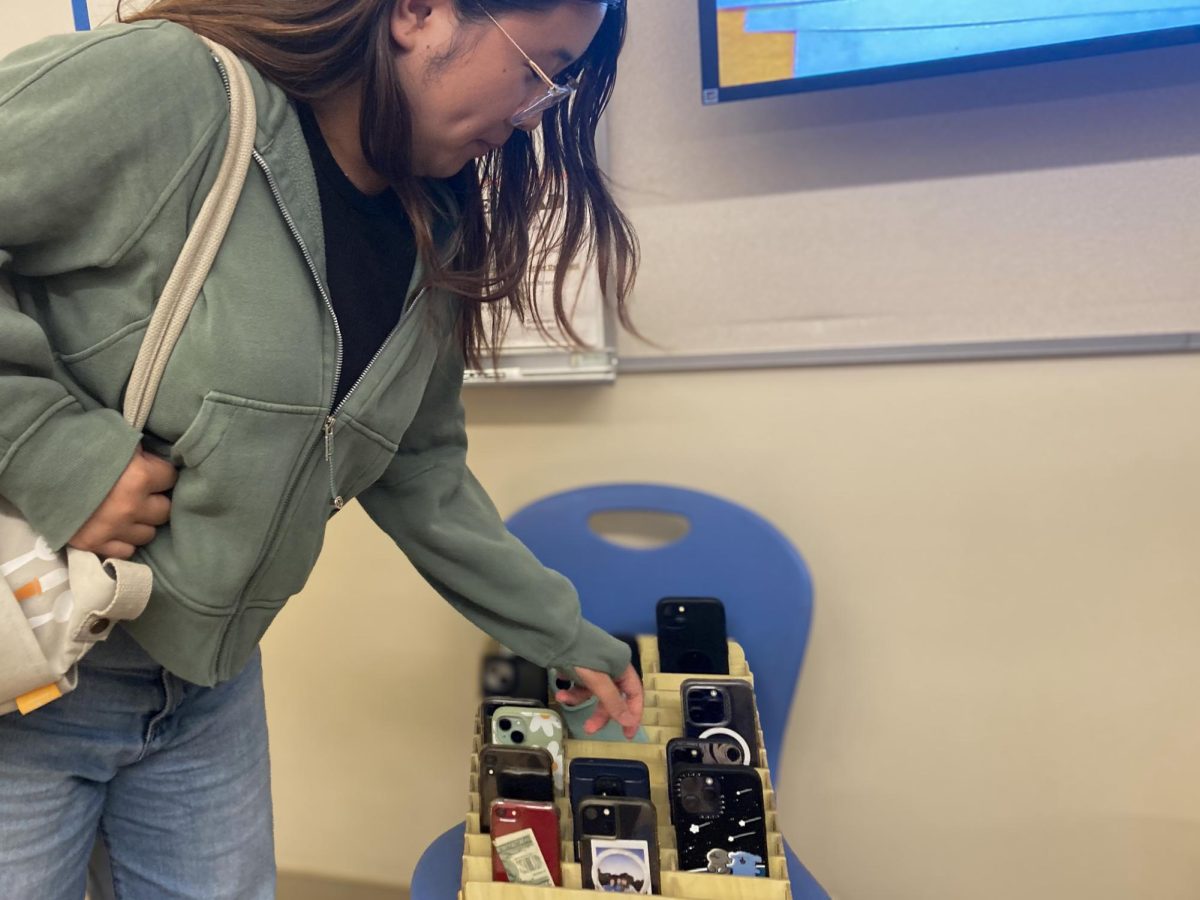
Kristine Lin
In the fourth period AP Calculus BC class at Palo Alto High School, senior Crystal Li places her phone in the “phone jail.” Starting July 2026, this may become a normal procedure across schools in California thanks to Governor Gavin Newsom signing the Phone-Free School Act into law last week. According to Li, there are often unnecessary complications that come with enforcing phone restrictions. "It becomes a hassle putting it [a phone] in [the phone jail] before class, and taking it out after class," Li said. "There have been multiple times where kids from other periods interrupt the teacher to come back in and pick up a phone they left."
Editors’ Note: The headline for this story has been updated to avoid misleading interpretations of the PAUSD district phone policy plans.
California schools will soon be restricting phone use during school hours after Governor Gavin Newsom signed the Phone-Free School Act into law last week.
The legislation requires school districts across the state to restrict cell phone use, starting July 1, 2026.
According to a press release from the governor’s website, Newsom said the policy aims to redirect students’ focus from their phones to schoolwork.
“We know that excessive smartphone use increases anxiety, depression, and other mental health issues – but we have the power to intervene,” Newsom said. “This new law will help students focus on academics, social development, and the world in front of them, not their screens, when they’re in school.”
According to Assistant Principal Jerry Berkson at Palo Alto High School, the district is already making plans to accommodate the change.
“We have two years to figure it out, if we want to take that long,” Berkson said. “We will be putting together a committee this year to talk about it. We’re going to do a survey on the amount of teachers who are already doing it [phone restrictions], so we get feedback on how that’s looking.”
Berkson said he expects many teachers to be in support of enforcing phone restrictions.
“How we do it, whether it starts next year or sooner, that’s up in the air right now, but I don’t think there’s one teacher on campus who would argue if it started sooner than later, and I bet there’s a lot of students who would be good with it,” Berkson said.
The act has raised concerns among Paly students. According to freshman Yuee Lim, she is worried about the strictness of the policy.
“It would be unfair if phones were banned from the school entirely,” Lim said. “In parts of class, if you’re done with all your work and you’re not disrupting the class, then I think it’s a reasonable excuse to use your phone.”
Junior An Nguyen shared a similar opinion, adding that phone usage is an individual responsibility.
“It’s good for people not to use them [phones],” Nguyen said. “But I also believe that as long as it’s not distracting anyone else and you’re only distracting yourself, it’s your fault. … It’s your own responsibility to be paying attention in class.”
Junior Tristan Levesque said phones are a necessity for many students, and that losing his phone would mean losing a way of contact in emergencies.
“People need to be in contact with you through your phone,” Levesque said. “You’ll see if your parents texted you. If it’s urgent, you won’t be able to see that in some cases where you really need to know. It’s just good to have it on you as a just-in-case measure. And if you take that away, you’re going to be really out of it.”
Despite these arguments, Berkson said students without phones will not be put at any disadvantage during emergency situations.
“We used to have them [parents] call the main office if there was an emergency,” Berkson said. “People would say in the event of a major emergency at school that they can’t contact a kid. We don’t want people contacting their kids, or kids contacting their parents, during the first part of an emergency anyway, because there are certain things they [the students] should be focused on doing.”
According to freshman Helen Li, her teachers are already practicing phone restrictions.
“Currently, my English teacher has us lock our phones away in a phone cubby at the start of every period, which she then puts into a cabinet, and we’re not allowed to access them until the end of the period,” Li said. “My science teacher also has us put our phones in our cubby.”
Levesque said most students in his class oppose the phone cubby rule.
“They have phone boxes and I find none of the students have fun in that class,” Levesque said. “It feels controlling.”
On the opposite side, Berkson believes the policy will be a step in the right direction for improving student learning and redefining campus culture.
“I’ve been in classrooms where kids are playing Super Mario Kart,” Berkson said. “I think it’s great taking away that temptation. It’s just a culture change that students will need to get used to, but it’ll be for the good.”
English teacher Alanna Williamson said the policy is necessary to keep students engaged in class.
“The need for it [a ban] comes from wanting students to be more present and not to have distractions,” Williamson said. “It’s also about learning how to mitigate the discomfort that comes from not being able to reach for your phone and find that distraction.”